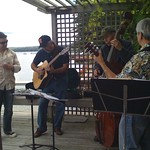 On Oct. 11, 2018, the Music Modernization Act was signed into law in the U.S. According to the GRAMMY Advocacy & Public Policy Office, the Act does the following:
On Oct. 11, 2018, the Music Modernization Act was signed into law in the U.S. According to the GRAMMY Advocacy & Public Policy Office, the Act does the following:For SongwritersHowever, as Ed Christma notes, there is work to be done - and done quickly - in order to implement the act. This includes the creation of a music licensing collective, with a board of directors. Christma writes that:
For Artists
- Creates a new and transparent collection entity to ensure that songwriters always get paid for mechanical licenses when digital services use their work
- Lets ASCAP and BMI secure fair rates for their songwriters
- Establishes fair compensation for songwriters when the government sets rates
For Studio Professionals
- Closes the "pre-1972 loophole" so that digital services will pay legacy artists the compensation they deserve
- Establishes fair compensation for artists when the government sets rates
For Fans
- Gives copyright protection to producers and engineers for the first time in history
- Provides fans with more access to music across digital music services due to better music data sharing
The collective will need a board of directors comprising 10 publishers; four songwriters who own their own publishing; and three nonvoting advisers, including one who will represent the digital services.Also a "global database to collect song information and match compositions to recordings" needs to be built. That in itself is now small feat. Near the end of his article, Christma says:
The collective must begin operations by Jan. 1, 2021, at which time the statutory blanket licenses take effect. It took 20 years to get to this point; now the industry has 26 months for step two.So much to do and do quickly indeed.
The U.S Copyright Office
The U.S. Copyright Office has played a role in developing this legislation and the law does modify Title 17. In its overview of the law, the Office states:
Title II—Classics Protection and Access, among other things, brings pre-1972 sound recordings partially into the federal copyright system by extending remedies for copyright infringement to owners of sound recordings fixed before February 15, 1972. The federal remedies for unauthorized use of pre-1972 sound recordings shall be available for 95 years after first publication of the recording, ending on December 31 of that year, subject to certain additional periods. These periods provide varying additional protection for pre-1972 sound recordings, based on when the sound recording was first published:Note that as of this writing (10/24/2018), the text of the Copyright Law available on the U.S. Copyright Office website had not yet been updated to reflect changes due to the Music Modernization Act and the Marrakesh Treaty Implementation Act.
This section applies a statutory licensing regime similar to that which applies to post-1972 sound recordings, e.g., the statutory licenses for noninteractive digital streaming services — such as internet radio, satellite radio, and cable TV music services. It also establishes a process for lawfully engaging in noncommercial uses of pre-1972 sound recordings that are not being commercially exploited. The legislation also applies certain existing title 17 limitations on exclusive rights and limitations on liability to uses of pre-1972 sound recordings, e.g., sections 107 (fair use), 108 (libraries and archives), 109 (first sale), 110 (certain public performances), 112(f) (certain ephemeral copies) and 512 (safe harbor provisions for online service providers).
- For recordings first published before 1923, the additional time period ends on December 31, 2021.
- For recordings first published between 1923-1946, the additional time period is 5 years after the general 95-year term.
- For recordings first published between 1947-1956, the additional time period is 15 years after the general 95-year term.
- For all remaining recordings first fixed prior to February 15, 1972, the additional transition period shall end on February 15, 2067.
Now What?
Music copyright is not my strength and so I'm on the lookout for good articles about what this might mean for libraries. Does it change what libraries do on a day-to-day basis? Does it change what music libraries have access to? Does it impact digitization? Is there a consequence that isn't obvious? I'm seeing nothing that points to the answers of those questions being "yes", but I'm also not seeing anything that says the answer are "no." At this point, I'm looking forward to the updated book by Dr. Kenneth Crews, which I know he is revising to include changes to copyright law which have occurred this year.
Do keep in mind that some aspects of the law do not go into effect until 2021, so we have time to panic about some of the details!
Resources:
- Music Modernization Act. 2018. H.R.5447. 115th Congress.
- U.S. Copyright Office. (n.d.) Orrin G. Hatch–Bob Goodlatte Music Modernization Act
- GRAMMY Advocacy & Public Policy Office. (n.d.) Music Modernization Act
- Music Modernization Act's Next Challenge: How to Implement the Law
- Mark H. Wittow, Mark H., Katherine L. Staba and Trevor M. Gates. (10/11/2018). A Modern Melody for the Music Industry: The Music Modernization Act Is Now the Law of the Land
- Buchwald, Elisabeth. (10/11/2018). Flanked by musicians, trump signs music copyright bill into law.
- Barr, Luke. (10/11/2018). Trump signs bill that ensures music streaming services pay artist royalties.
- Deahl, Dani. (10/11/2018). The Music Modernization Act has been signed into law.
- Arntsen, Emily. (10/4/2018) Copyright law is getting a makeover. What does that mean for the music industry?
- Hart, Terry. (05/07/2018) No, the CLASSICS Act is not a “term extension”
- Bromley, Jordan. (2/23/2018) The Music Modernization Act: What Is It & Why Does It Matter? (Guest Column)
No comments:
Post a Comment